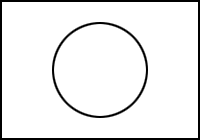Positive Health Online
Your Country

The Use of The Past in Psychotherapy
by Sheldon Litt, Ph.D.(more info)
listed in holistic psychotherapy, originally published in issue 47 - December 1999

Fig. 1 White Circle (the past) on light background

Fig. 2 The same White Circle on a dark background
The circles are identical, but appear different due to the changing field (background)
The past occupies a sacred place within classical psychoanalytic theory and practice, which is not surprising considering Freud's interest in archaeology. (He owned an extensive collection of ancient, archaeological objects which he had on display in his office.)
This emphasis on the past has even been carried to further extremes since Freud. Now we have seen a large number of therapies based on a march back into time – re-birthing, which takes the patient back to the moment of his birth, is one example. But even going back so far is apparently not enough for some aspirants of The Past. One offshoot of these excursions into "bygone times" even claims to explore the "Past Lives" of the patient before birth. Now that is going back a long way, if it can be called going back at all! One might think that there is no end to this fascination with what has been, but I have met active psycho- therapists in practice who believe fervently that the most important events in a person's life are: (1) the moment he was conceived, (2) his mother's reaction to the discovery that she was pregnant, and (3) the father's reaction to finding out that he is about to become a father. According to these practitioners, a person's entire personality is a combination of the emotional states of these three past events. Now that is taking the past to a new level of interpretation, I would say.
So we see that there seems to be no end to the fascination with the past, and I'm certain that there are many other schools of psychotherapy which I haven't yet encountered which consider a thorough exploration of former times the essence of their practice. I am also reminded of the tremendous growth in Psychohistory, analysing historical figures through the lens of their childhoods. Thus, Alice Miller explains Nazism by recourse to the historical speculation that Hitler's father beat his son Adolf at a very early age. Now there are skeptics who claim that Hitler was not beaten by his father; in today's morning newspaper a column by a historian attacks the accuracy of Alice Miller's information about the early days of the German Führer.
So what are we to make of this emphasis on The Past?
A modern Russian history scholar has expressed his scepticism of the psychohistorians in the following elegant words: "The problem with the past, as every history is aware, is knowing whether it existed."
In psychology too, we should try to become more aware ofthe difficulty of knowing what happened in the past, and if it happened at all.
Of course, the existentialist view of the past runs counter to this current trend, or one might say socio-epidemic, of blaming everything on one's childhood. For Jean-Paul Sartre, such explanations are an example of "bad faith", a self-deception used to avoid taking responsibility for one's own actions. It is all too easy a way to explain present-day behaviour (the alcoholic had a non-loving mother, etc.).
Such common avoidance of awareness of one's choices is, according to Sartre, the equivalent of writing a blank cheque. Days when I'm feeling depressed, I can point to all of the mistakes my mother made; at other times, when I am feeling ok, I don't think of her at all.
The existential standpoint is clear: it is not that the past determines the present, but rather that the choice I make now, how I define my existence in the present shapes how I view my past. That is, to put it in gestalt terminology, the past is not a "fixed gestalt", but instead it is more accurate to state that we only know the past as a perceived figure on the background of the present moment. How I choose my present will influence my interpretation of the past, since the past is a figure on the background of my present.
Refer to the figure/ground illustrations. A light figure on a dark background is seen differently from the same light figure on a light background. Thus, we only know the past as a figure on the field of the present day. How we are in the Here & Now influences our view of the past.
A couple of concrete examples will clarify this point succinctly: imagine a group of schoolboys complaining about school – the teachers are terrible, tough exams, bad food, nasty atmosphere, etc.
An endless litany of hellish grumblings. Now, let's look at the same boys 25 years later, as they meet for a Class Reunion. In the heady party atmosphere, they reminisce grandly about "the good old days" of school!
Again, Joe Smith gets married in 1985, but divorces his wife the next year complaining how horrible she is – she's lazy, can't cook, nags him, and worst of all, doesn't get along with his mother. Now, in 1999 he re-marries, and finds his second wife is so bad, a real witch who beats him, that he constantly talks to his friends about his first wife being a wonderful angel! She was so soft and kind, etc.
What then is the Truth about The Past?
Van den Berg, the Dutch phenomenological psychiatrist, puts it this way: the patient suffers less from his past than from a Mythification of his past – a way to explain away the present.
So let us be careful about the explanatory value of the Past. Which past is the true one? In reality, the past is only known from today's perspective; we view our past according to how we choose our existence now.
Comments:
-
No Article Comments available